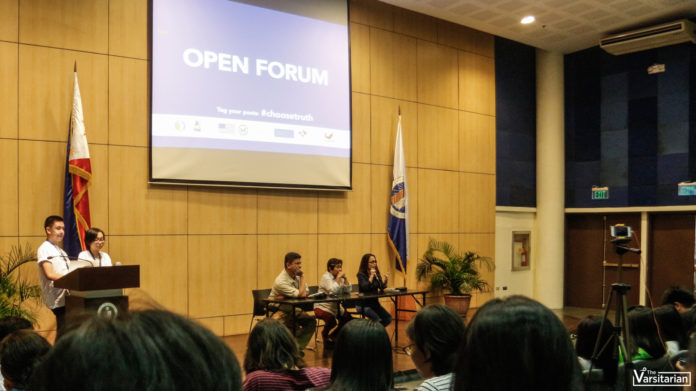
VETERAN media practitioners urged campus journalists to read newspapers instead of solely relying on social media for information, amid the prevalence of fake news sites on the internet.
“Inaasa ninyo ‘yung editorial judgment ninyo sa mga kaibigan ninyo [which] is not necessarily a bad thing because it’s a social network but to rely on that is a bad thing especially if you are reporters,” broadcast journalist Ed Lingao said in a campus journalism seminar at the Ateneo de Manila University last June 15.
As the media continue to face the challenges of fake news and internet trolls, Lingao challenged campus writers to listen and empathize more with their readers.
“For us (press), what does this mean? It is the best and worst of times. This is the time for you to be good reporters, not mediocre [ones]. Read more than you write, listen more than you speak, and empathize. Change the world one story at a time,” he said.
Arlene Burgos, head of the social media and mobile operations of ABS-CBN News and Current Affairs, said social media became a “game-changer” in the 2016 national elections.
“The 2016 elections [as] a critical incident [demonstrates] how big a game changer social media is,” Burgos said.
“[In] the next three to five years from now, everyone in this room would probably be consuming their news, probably discovering their news via their mobile and via social [media],” she added.
ABS-CBN contributing editor Inday Espina-Varona called on internet users to discredit fake news articles.
“I think that the best way to fight lies on social media, or fake news is by putting yourself out there and being brave enough to discourse. Trampling down on our freedom of expression is never the answer,” she said.
The internet is best used to help those who have access to it, but netizens should be conscious and careful about what they post online, Espina said.
“[W]hen we condemn trolls, do we check our own behavior? These are some of the social media minefields. But the biggest minefield online is sometimes in our zeal to help, we might be doing more harm than good,” Espina added.
The day concluded with a round-table discussion on campus press issues, which featured editors in chief of the Varsitarian, Ateneo’s the Guidon and Matanglawin, and the University of the Philippines-Diliman’s Philippine Collegian.
The conference, titled “Campus Journalism Challenge: Truthtelling in the Age of Social Media,” was spearheaded by the Ateneo Asian Center for Journalism, Association of Communication Majors, the Guidon and Matanglawin.














